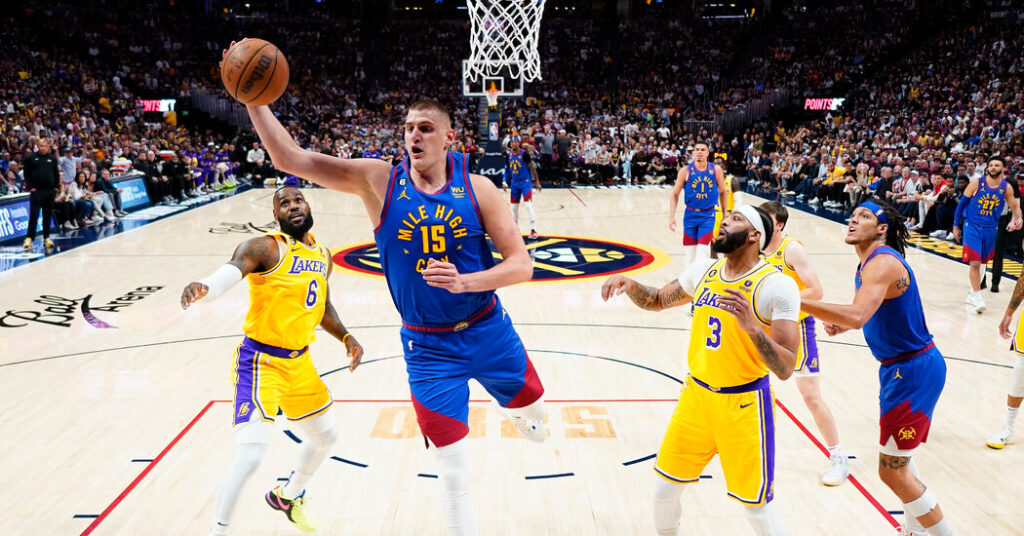The Denver Nuggets have spent the past few months hearing that they weren’t to be trusted in the playoffs, that Nikola Jokic, a two-time most valuable player, couldn’t lead them to postseason success, that their record, the best in the Western Conference for most of the season, was some kind of mirage.
Nobody was scared of them in the playoffs, or so the narrative went.
But in the first two rounds of the playoffs this year, the Nuggets had defied their reputation of fading in the postseason by easily dispatching Minnesota and Phoenix. They seemed to be doing the same to the Lakers on Tuesday night, as they dominated for most of Game 1 of the Western Conference finals. But as the second half wore on, Denver left room for doubts about their playoff toughness to creep back in.
Fair or not, what’s at stake for the Nuggets in this series, which they lead, 1-0, after a 132-126 win on Tuesday, is their ability to prove that their elite play is not an illusion that disappears in May.
“We’re a long ways away from what we’re trying to do,” Nuggets Coach Michael Malone told his team in the locker room after the game.
The Nuggets have never been to the N.B.A. finals, and they haven’t competed in a championship round since their last season in the American Basketball Association, in 1975-76. Most of that disappointing history can’t be blamed on their current group.
But even now, something happens year after year to prevent the Nuggets from competing for a title, and they have been blamed for that.
Jokic has been an All-Star for the past five seasons, but Denver has been to the conference finals only once in that time, in 2020. The Nuggets lost to the Lakers in five games that year, which played out at a closed site at Disney World in Florida because of the coronavirus pandemic. They fell out of the postseason even sooner in each of the next two years without their talented point guard Jamal Murray, who tore the anterior cruciate ligament in his left knee about a month before the 2021 playoffs.
Then this season’s Nuggets started to look unbeatable.
They were in or tied for first place in the West from Dec. 20 through the end of the season. Jokic had another M.V.P.-caliber year, though he lost the award to Philadelphia’s Joel Embiid. Murray was resurgent after a year and a half spent recovering from his knee injury. The Nuggets won 75 percent of their games in January and February.
Perhaps it was their lackluster effort in March, when the Nuggets were 7-7, that convinced observers that they weren’t as dominant as a top seed should be. Or perhaps they were just being punished by public opinion for past playoff performances.
They seem ready to change the conversation this time, though they claim to ignore it.
They cruised past the Timberwolves, then humiliated the Suns in the second round with a 25-point win in the series-clinching Game 6.
“I guess I don’t know how a championship team looks,” Jokic said after the series, “but I think that’s how it’s supposed to look. We were so focused on every detail.”
But now the matchup against the Lakers has evoked memories of a Denver team these Nuggets don’t want to look like: the one that lost to the Lakers in the conference finals in 2020, the last time they met in the playoffs. Now both teams are almost entirely different except for the stars: Jokic and Murray for the Nuggets and LeBron James and Anthony Davis for the Lakers. Kentavious Caldwell-Pope, a key role player for the Lakers in 2020, is now a key role player for the Nuggets.
They are all older, for better or worse. Before, the Lakers were driven by James’s play. Now, Davis’s role matters much more than it used to.
For two and a half quarters of Tuesday’s game, this year’s Lakers seemed to be no match for this year’s Nuggets, and skepticism about Denver’s championship aspirations felt silly.
Denver scored 72 points and led by 18 at halftime. Jokic already had 19 points, 16 rebounds and 7 assists.
“It took us a half to get into the game,” James said. “That was pretty much the ballgame right there.”
In the Lakers’ previous series this postseason, against Memphis and Golden State, Davis’s mere presence scared opponents out of the paint. That wouldn’t happen against the Nuggets. For much of the game, Davis was chained to Jokic in a way that prevented him from being the force he had been against the Warriors.
The Lakers hadn’t played someone like Jokic yet in the playoffs, in part because there is no one quite like him — a big man who passes as effortlessly as he scores. It’s why Lakers Coach Darvin Ham had jokingly suggested on Monday that perhaps the only way they could stop Jokic was to kidnap him.
Midway through the third quarter Jokic had already notched a triple-double.
Then, to stop a Lakers’ run late in the third quarter, he hit an off-center, step-back 3 at the buzzer, with a smothering Davis waving his arms. Davis left the court wearing a wry smile. He’d done all he could and it still wasn’t enough to stop Jokic.
Jokic finished with 34 points, 21 rebounds and 14 assists. Davis had 40 points and 10 rebounds.
In the Nuggets’ locker room after the game, Malone addressed his team with pride and caution. Good win, he said in comments aired on ESPN, but also: Play better defense.
Ham hinted that he hadn’t shown all of his potential adjustments in Game 1. Malone said that he would rather fix mistakes after a win than after a loss.
What will ultimately matter more for legitimizing the Denver Nuggets as a championship threat is not how they win these games, but that they do.


